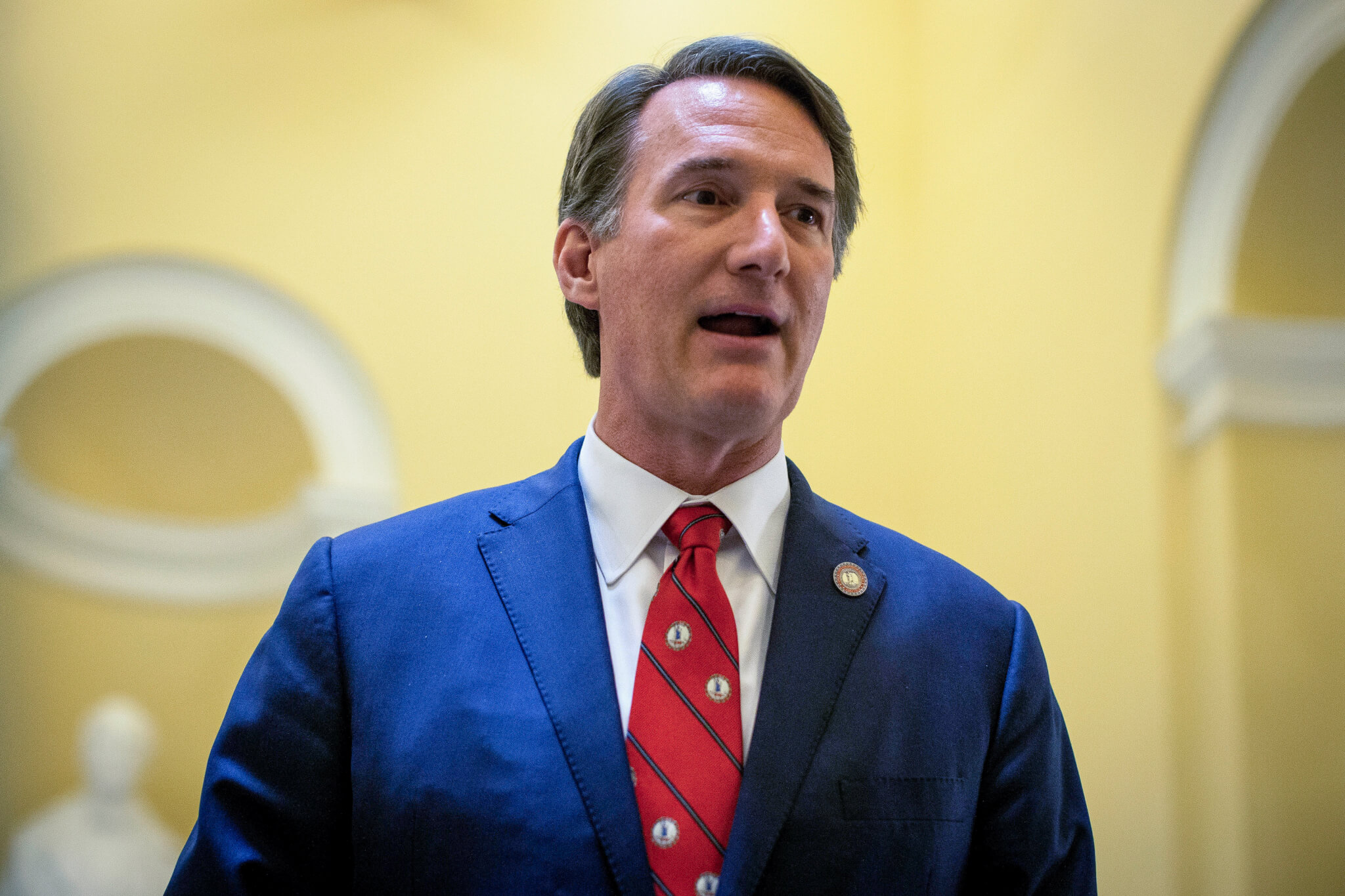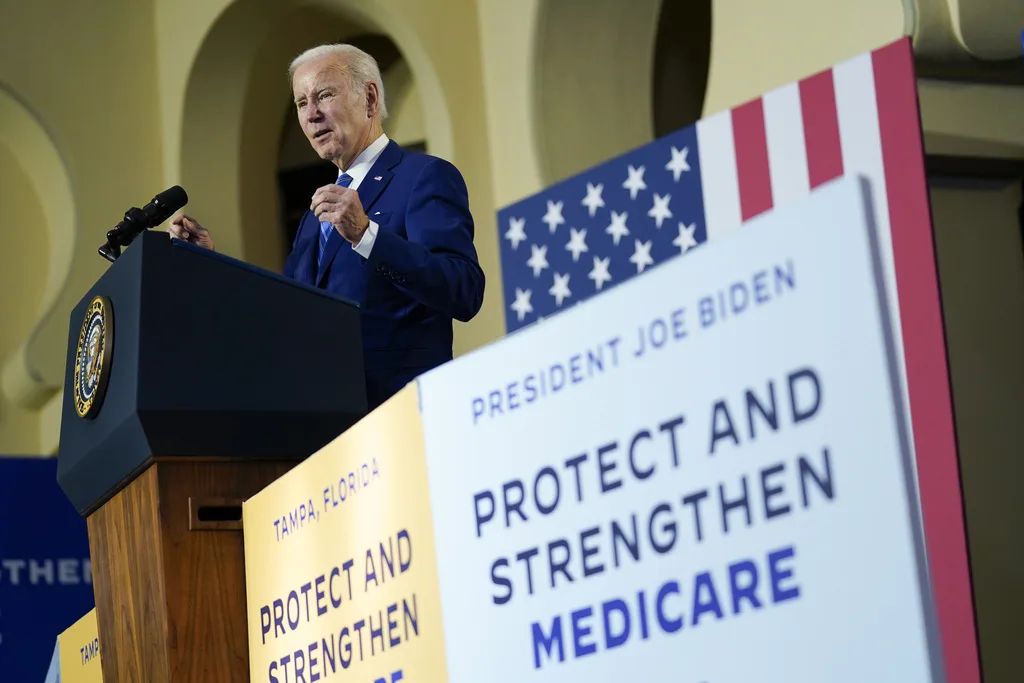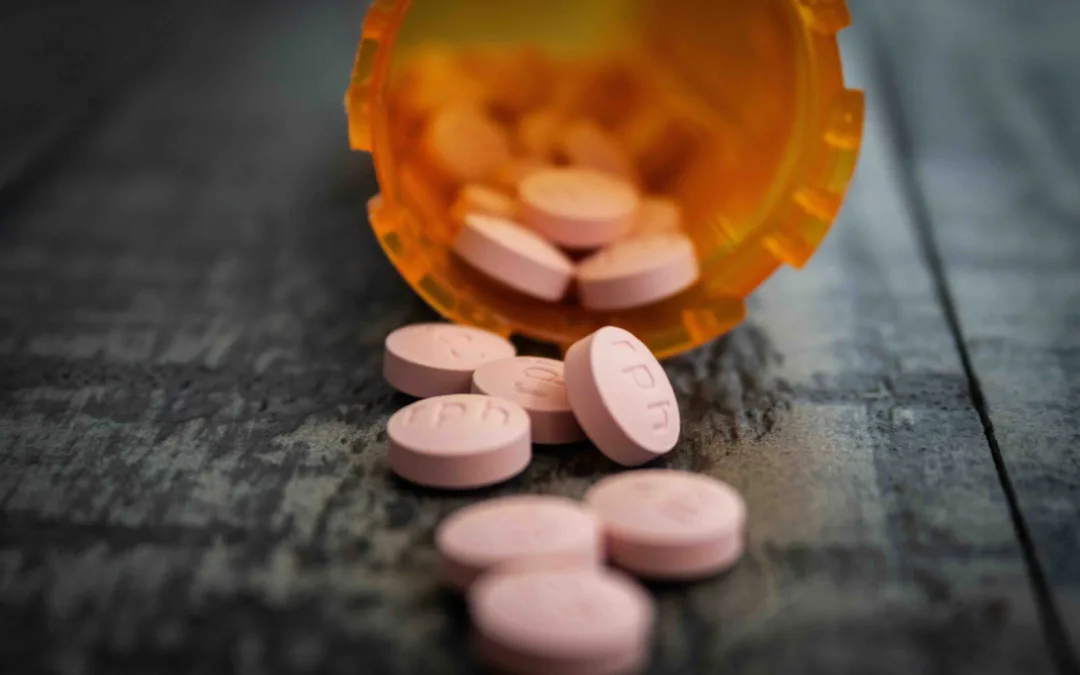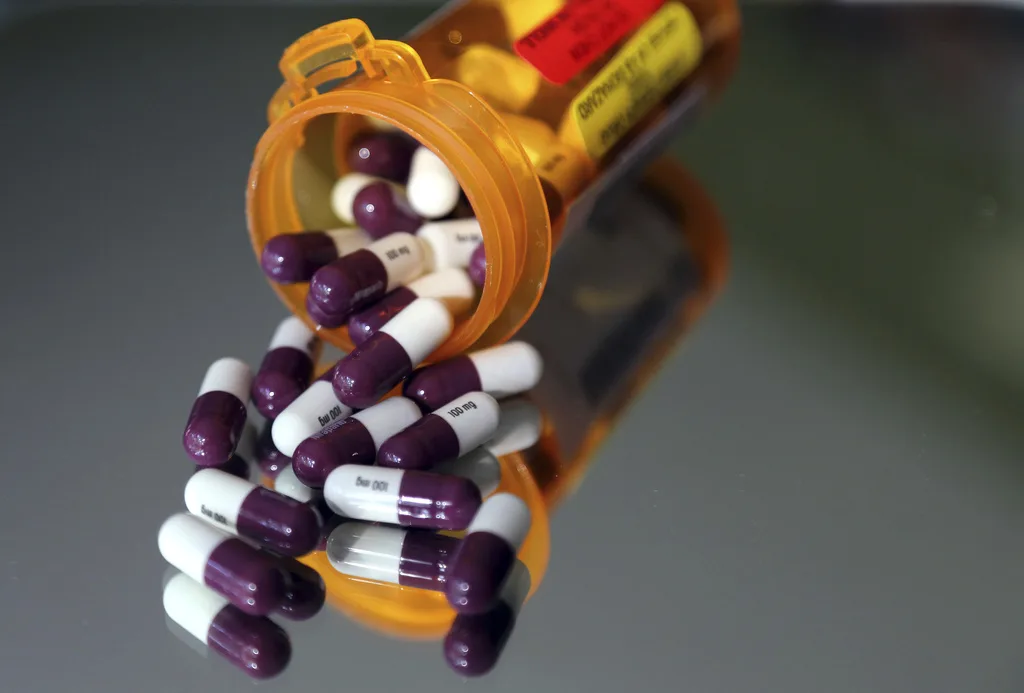
FILE - Virginia Gov. Glenn Youngkin speaks to members of the press inside the Rotunda of the state Capitol building, Feb. 25, 2023, in Richmond, Va. (AP Photo/John C. Clark, File)
When he was running for governor in 2021, Glenn Youngkin said he would work to lower prescription drug costs.
“I look forward to undertaking a comprehensive review, taking on not just the drug companies, but all of the players in the supply chain to make sure that we have transparency and much more competition in order to bring prices down and see exactly what they’re paying, but also have choice,” Youngkin told the AARP. “As governor, I’ll undertake that immediately.”
Three years later, all eyes are on Youngkin to see whether he’ll sign legislation that could help lower those costs—or veto it in the face of a furious lobbying push from pharmaceutical groups.
House Bill (HB) 570 and Senate Bill (SB) 274, introduced by Del. Karrie K. Delaney (D-Fairfax) and Sen. R. Creigh Deeds (D-Charlottesville) respectively, would establish a Prescription Drug Affordability Board (PDAB), which would have the power to review drug costs and limit how much state agencies, health plans, and individuals pay for certain prescription medications.
The idea is a broadly popular one. A 2023 survey conducted by the Wason Center for Civic Leadership at Christopher Newport University, found that 75% of Virginia voters supported the creation of a PDAB.
The effort to establish the board comes as Virginians have been spending more and more on prescription drugs in recent decades.
In 2020, they spent 36% more per person on prescription drugs than the national average, according to a study conducted by Altarum, a nonprofit research and consulting organization. From 2015 to 2020, Virginians’ average spending on prescription drugs rose from $1,400 to $1,500 per year, a 6.6% increase and more than twice the national increase. And in 2023 alone, Virginians spent a combined $3.2 billion on prescription drugs in the commercial market.
Youngkin has until April 8 to either sign, veto, or recommend amendments to these bills.
A similar bill was introduced in the Virginia Senate during the 2023 legislative session, but Republican lawmakers, then in the majority, blocked it from passing. In doing so, they helped pharmaceutical companies who have argued in the past that a board with review and price oversight powers would have a “chilling effect” on investment in the state’s drug research and development industry.
Just months after House Republicans killed the bill, the Pharmaceutical Research and Manufacturers of America (PhRMA), donated $60,000 to Youngkin’s Spirit of Virginia PAC, which was the top donor to both the Republican Party of Virginia and to the House Republican Campaign Committee last year. In total, Youngkin and his associated political action committees have raised nearly $300,000 from pharmaceutical companies and executives during his career.
PhRMA also gave more than $20,000 directly to GOP Virginia House campaign committees last year.
This year, the pharmaceutical industry is once again making another push to kill the bill.
The Virginia Biotechnology Association sent a letter to the governor urging him to veto the bills, saying they would “stifle necessary investments in continued research and development, threatening the ability of Virginia biotechnology companies to bring new medicines to market.”
A representative of the Virginia Chamber of Commerce also testified in opposition to the creation of a PDAB during this year’s legislative session, echoing concerns about hindering the growth of the pharmaceutical industry in the state by instituting price caps.
That argument remains unconvincing to Delaney, who last year pointed out the astronomical amount that pharmaceutical companies are spending on marketing and advertising, rather than research and development.
“As long as we’re seeing those types of investments, it’s going to be very hard to convince me that all of that money that could have been going into research and development would be serving a better place in an ad budget,” she said.
Youngkin’s team has not said whether or not the governor would sign the legislation, or even if he’s reviewed the letter, saying only that Youngkin “will review any legislation that comes to his desk.”
To counter the pharmaceutical lobby’s pressure campaign against the bill, a coalition of community groups and legislators met in Roanoke on Wednesday to kick off the “Make Medicine Affordable” mobile billboard tour. Virginians shared stories of how the high costs of medicines have affected their lives, and called on Gov. Youngkin to sign the bills.
Roanoke resident David Harper said that it costs him $635 for 60 tablets of Eliquis, a blood thinner he relies on to stay alive. Since the drug entered the market just over a decade ago, it’s more than doubled in price.
“The cost of medicine has gotten outrageous,” he said. “Imagine having a drug you need to stay alive more than doubling in price. How many people can say their pay doubled in the last 10 years?”
Groups such as AARP Virginia and Freedom Virginia attended the event as well; the tour will make stops in other Virginia cities over the next few weeks.
If Youngkin signs the legislation, Virginia would become the eighth state to establish a Prescription Drug Affordability Board, joining Colorado, Maine, Maryland, Minnesota, New Hampshire, Oregon, and Washington.
Politics

Biden administration bans noncompete clauses for workers
The Federal Trade Commission (FTC) voted on Tuesday to ban noncompete agreements—those pesky clauses that employers often force their workers to...

Democratic shakeup in Virginia primaries for governor, lieutenant governor
Richmond Mayor Levar Stoney quit his bid for governor and jumped into the race to be the Democratic nominee for lieutenant governor. The race for...
Local News

The zodiac signs of 12 iconic women offer insight into their historic accomplishments
Zodiac signs can tell you a lot about someone’s personality. Whether they’re an earth, water, air, or fire sign, these 12 categories (which are...

Virginia verses: Celebrating 5 poetic icons for National Poetry Month
There’s no shortage of great writers when it comes to our commonwealth. From the haunting verses of Edgar Allan Poe, who found solace in Richmond's...





